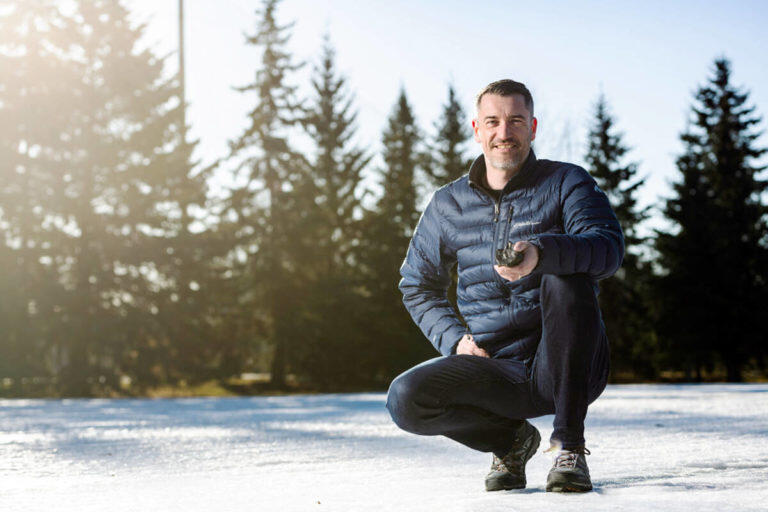It would surely be inaccurate to say Nanaimo Astronomy Society’s next guest speaker has rocks in his head, but they are certainly foremost on his mind, especially rocks from Mars.
Chris Herd is an Earth and atmospheric science professor at the University of Alberta and curator of the university’s meteorite collection, the largest university-based meteorite collection in Canada. He’s also one of 15 scientists in the world helping NASA select where to take core samples from the Martian surface being collected by the Mars Perseverance rover. Those samples will one day be brought back to Earth.
“One of the primary goals of the Perseverance rover mission is to collect those samples … and get a nice set of different samples that will then be sealed up in tubes,” Herd said.
Perseverance takes small rock core sample, seals them in tubes and then places them in caches or depots. The current plan for retrieving the samples involves a second rover, called a “fetch” rover that will collect the samples, load them into on a separate lander that, once loaded, will blast off from the Mars’s surface and into orbit around the planet.
“So that’s two spacecraft already … and then there needs to be another one, an orbiting mission, that would rendezvous with the container with the samples in it, grab that container and then turn around and head for Earth,” Herd said.
Herd’s presentation will focus on the Perseverance rover mission, how it collects samples and what’s been achieved so far “as well as all the other great things that the rover can do. The images that we get. The analysis of the rock that we do before we get a sample of it and that sort of thing.”
Herd’s fascination with rocks started when he was 13 and decided he really wanted to study the first Martian rocks brought to Earth.
“I grew up around geology. My father was the retired curator of the National Meteorite Collection in Ottawa and he did a lot of geology field work, especially in the summer when I was growing up, and I just came to love geology at an early age,” he said. “It was somewhere around that time I’d been reading science fiction, Isaac Asimov and other authors, when I thought, wow, just think about everything that goes into geology and the Earth. Imagine trying to do that on another planet.”
Herd said Mars is very much like Earth, yet completely different because it took a different turn in its 4.5-billion year history and became incapable of hosting life.
“At some point, we now know, it probably could have been … certainly capable of hosting life – maybe microbial life,” he said.
Herd explained the role of scientists involved with NASA’s return sample program is to be the documentarians of the samples and to help make the decisions where to sample.
“Ultimately our job is to get a sample suite … A suite implies representative samples of rocks that you walk across in a field area that are going to allow you to answer those key questions when you get them back to the lab,” Herd said. “That’s our job, is to make sure we get a good sample suite with all the documentation about where they were collected and when and how and that, we hope, will eventually compel NASA and the European Space Agency to make sure that those follow-on missions happen to bring them back to Earth eventually.”
Herd has studied meteorites that originally, through natural forces, were ejected from the Martian surface and fell to Earth – about 170 of them have been collected – but they don’t contain the information or evidence for life because they are geologically too young, perhaps a few hundred million years old. What’s needed are rocks that are in the range of 2 billion to 2.5 billion years old – the period life could have begun to form on Mars – and can only be collected from certain areas of the Martian surface where the rover is operating.
‘The ideal thing would be to actually find evidence of ancient life,” Herd said. “That’s the ultimate goal.”











